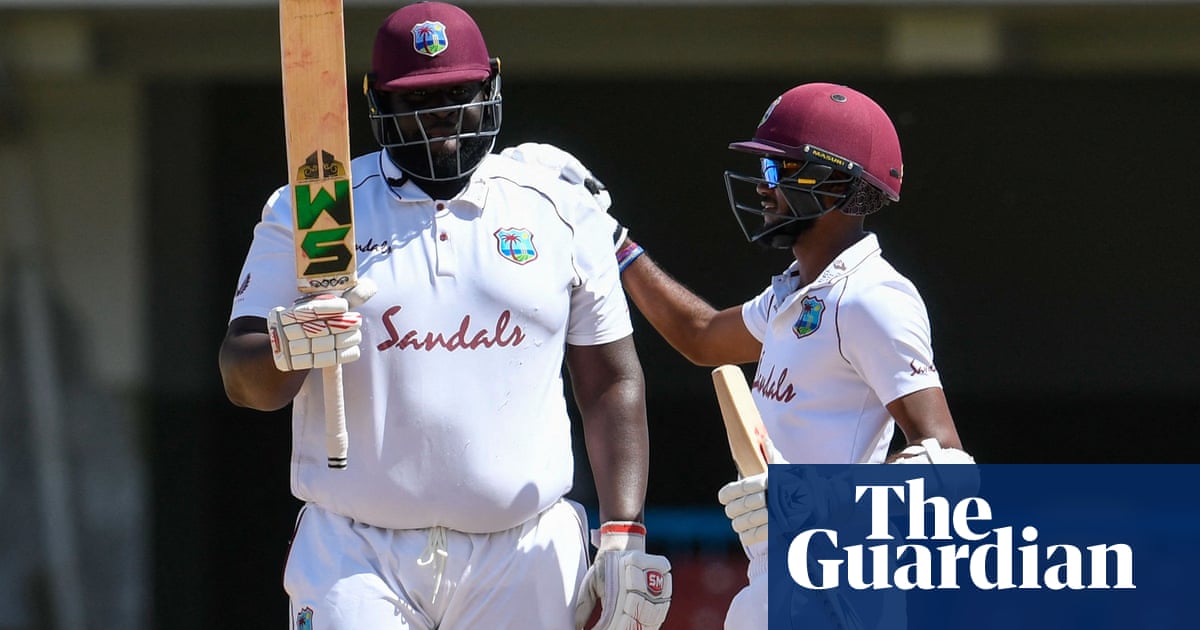The new generation of West Indies fans who have embraced the maroon - 5 minutes read

West Indies’ Rahkeem Cornwall (left) with Kraigg Brathwaite during the recent second Test against Sri Lanka in Antigua. Photograph: Randy Brooks/AFP/Getty Images West Indies cricket team The new generation of West Indies fans who have embraced the maroon Many have pledged support to a team made up of various different nations, in a sport their friends had no interest in
Rallying around the West Indies cricket team was never a difficult choice to make. My grandad had grown up with future greats such as Rohan Kanhai and Basil Butcher in Berbice, Guyana, while one of my mum’s earliest memories is of travelling hours and hours across the harsh rural landscape of the country just to see the team play at Bourda cricket ground in Georgetown.
This was heritage. Legacy. Having never even held a cricket bat growing up in inner-city London, I made the rational decision to embrace the maroon and pledge support to this team made up of various different nations, in a sport none of my friends had any interest in.
Unfortunately, this was also the 90s so I was witnessing the gradual decline of a once-great team, but I carried on supporting, from Curtly Ambrose to Chris Gayle, Shivnarine Chanderpaul to Shannon Gabriel. I followed on TV, scorecards, whatever the time of day, through the ups and downs … and more downs than ups. I had resigned myself to this fandom being a lifelong solo pursuit, something never discussed within my immediate circle.
In 2019, the magic of social media put me in touch with Machel Hewitt, now 40, who had also grown up in London with an equal passion for West Indies cricket. Machel credited his own love as part of “cultural legacy”, saying: “I benefited from the fact I was going back to Jamaica on holiday every year [as a child], so cricket was a tie to the homeland.”
Machel feels Caribbean cricket became so entrenched in his identity that the isolation of being a fan in England did not affect his commitment to supporting the side. “There was nobody to connect with. I felt I was on a one-man mission.”
We decided to create the Caribbean Cricket Podcast as an outlet to talk about modern West Indies cricket, something we felt wasn’t covered enough by an international media preoccupied with the glory days of the 1970s and 80s. “It was about seizing back the narrative, creating a podcast to show the UK diaspora were a community that still cared about West Indies cricket,” Machel says.
It was initially a hobby focusing on fans discussing topical issues in West Indian cricket, but then lockdown happened and we suddenly had more time on our hands. We began to approach players and stakeholders in the Caribbean. Our interview with the Trinidad wicketkeeper Joshua Da Silva was mentioned by Michael Atherton during the live broadcast of the England home series in July 2020 and since then, thanks to various factors, we have been privileged enough to interview numerous guests from the game, including my hero, Courtney Walsh.
What has been most interesting is the discovery of a small legion of Caribbean fans from the diaspora, generally aged under 45, who have also grown up in the UK quietly supporting the side, in dignified isolation, out of pure loyalty to the culture of their forefathers. It somewhat contradicts the image in this country of the only West Indian cricket fans left here being those old enough to remember watching the days of Clive Lloyd and his men at the Oval.
There has been well-documented research about cricket’s lack of engagement with the Caribbean community in this country and numerous theories as to why interest in the game essentially disappeared in the space of a generation. All are valid and represent a systemic flaw with the development of the game here, but with that larger backdrop in mind, it was interesting to find out what kept a small minority rallying in 2022.
For Jason Perrier, 43, growing up in England his stepdad “would listen to Test matches on the radio … he raised me to appreciate that cricket is as much of our culture as anything.” But he says any conversations he has about the game are with friends or colleagues who “are largely South Asian or white”.
Travis Newton, 41, embraced the team as a child after watching them with his Antiguan father – “in the 90s you only had one TV in the house”. He describes the sense of belonging the team provide, but also that as a fan he was isolated. “I grew up in a rough part of London, and other black boys round there really weren’t interested in cricket”.
Rosey, a cricket coach, moved to London from Montserrat as a teenager and despite initially finding cricket too expensive to play here got into coaching later as an adult. She still cheers on West Indies whenever they play, despite the distance: “There’s no escape. It’s in the psyche.”
Neeks Quamina, 30, from London describes going to the 2019 World Cup held in England and “the lack of West Indian fans at the grounds supporting the team. Not only were we heavily outnumbered by opposition fans, we had to rely on neutral supporters at the grounds to make up the numbers for us.”
Over the next few weeks we will hear the common catchphrase that West Indies are “everybody’s second-favourite team”, but across small pockets of the UK, the descendants of Caribbean migrants will be quietly rallying for what has always been their first team, the players in maroon that still bind them to their historical identity.
Source: The Guardian
Powered by NewsAPI.org